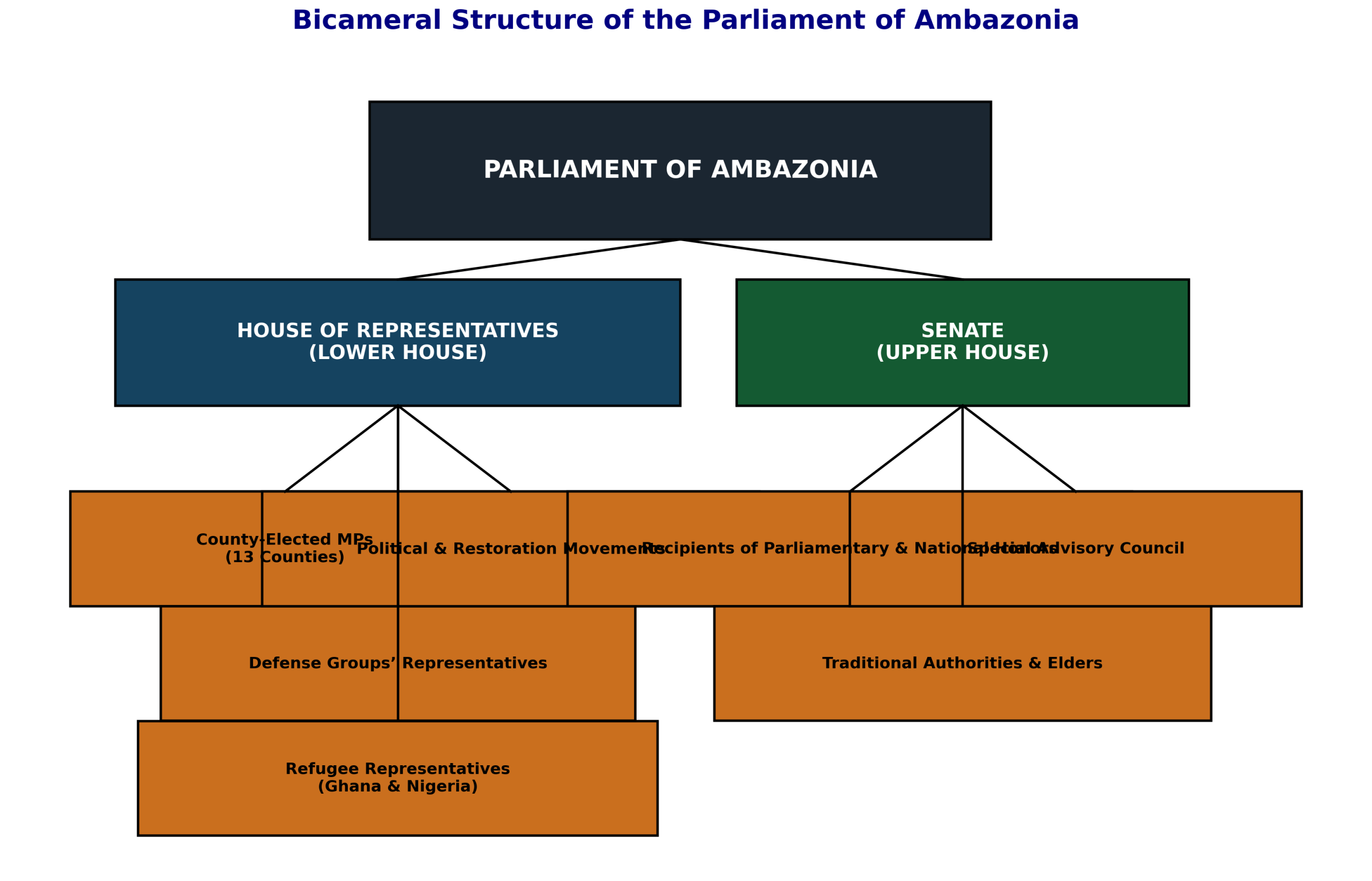Structure of Parliament

The Bicameral Parliament of Ambazonia
The Parliament of Ambazonia is designed as a bicameral institution, meaning it is made up of two chambers that complement one another in lawmaking and governance.
The Lower House – House of Representatives
The Lower House, often called the House of Representatives, is the people’s chamber. It draws its strength from direct representation across the 13 Ambazonian counties:
- Bui
- Donga-Mantung
- Menchum
- Boyo
- Mezam
- Momo
- Ngoketunjia
- Lebialem
- Manyu
- Kupe-Muanenguba
- Fako
- Ndian
- Meme
In addition to county representatives, the Lower House includes:
- Delegates from defense groups nominated by their generals,
- Representatives of political and restoration movements both at home and abroad,
- Representatives from refugee communities in Ghana and Nigeria.
This chamber is tasked with initiating laws, passing budgets, amplifying the voices of ordinary Ambazonians, and exercising oversight over government activities.
The Upper House – Senate
The Upper House, or Senate, functions as the chamber of stability, wisdom, and long-term vision. Its members are not elected in the same way as the Lower House but are instead drawn from the most respected strata of Ambazonian society. It includes:
- Recipients of parliamentary and national honors,
- Esteemed statesmen and patriots,
- Traditional authorities and elders who safeguard Ambazonian heritage,
- A special advisory council composed of experts in law, diplomacy, defense, and finance.
The Senate’s role is to review and refine laws passed by the Lower House, ratify treaties and constitutional changes, confirm national appointments, and act as a balancing voice that tempers popular passions with experience and moral guidance.
Joint Lawmaking and Oversight
Both chambers work together to make laws, approve budgets, and hold the executive accountable. Bills generally originate in the Lower House and are passed on to the Senate for further scrutiny and confirmation. This dual arrangement ensures that the Parliament reflects both the grassroots will of the people through county and refugee representatives, as well as the heritage, wisdom, and expertise of Ambazonia’s most seasoned voices.
Leadership of the Parliament
At the top of the structure is the overall Parliament, presided over by two leaders:
- The Speaker of the House of Representatives, and
- The President of the Senate.
These two leaders coordinate through a Joint Parliamentary Council, which serves to harmonize decisions between the chambers, resolve disputes, and ensure smooth functioning.
Why Bicameralism?
The reason for choosing bicameralism in Ambazonia is to balance democratic representation with continuity and stability. The Lower House speaks for the people in their immediate struggles and aspirations, while the Upper House provides the foresight and seasoned judgment that comes from experience. Together, they embody both the spirit of liberation and the wisdom of tradition, ensuring that Ambazonian law and governance are firmly rooted in the will of the people and guided by the enduring values of the nation.

Structure of Parliament
Introduction
The Parliament is composed of two chambers:
Lower House (House of Representatives / House of Commons) – directly represents the people and counties.
Upper House (Senate / House of Elders) – provides wisdom, oversight, and long-term national vision.
Both chambers must approve laws, budgets, and policies before they can become binding.
This is the people’s chamber, designed to give every Ambazonian community and liberation faction a voice.
Composition:
County-Elected MPs (from the 13 counties: Bui, Donga-Mantung, Menchum, Boyo, Mezam, Momo, Ngoketunjia, Lebialem, Manyu, Kupe-Muanenguba, Fako, Ndian, Meme).
Defense Groups’ Representatives (nominated by generals of liberation forces).
Political & Restoration Movements’ Representatives (from all active groups, home and abroad).
Refugee Representatives (delegates from refugee communities in Ghana and Nigeria).
Function:
Draft, debate, and pass bills.
Represent grassroots voices.
Initiate budgetary proposals.
Provide first-level oversight of government actions.
Upper House – Senate
This chamber provides stability, wisdom, and national oversight. It represents tradition, experience, and long-term vision rather than only numerical representation.
Composition:
Recipients of Parliamentary & National Honors (statesmen, patriots, and heroes recognized for outstanding service).
Traditional Authorities / Elders (custodians of Ambazonian culture and identity).
Special Advisory Council Members (experts in law, diplomacy, security, and finance).
Function:
Review and refine bills passed by the Lower House.
Act as a balancing force against populism or rash legislation.
Ratify treaties, high-level national appointments, and constitutional amendments.
Provide moral and cultural guidance for national direction.
Both chambers together:
Pass Laws – Bills start in the Lower House and must be approved by the Senate before becoming law.
Approve Budgets – Lower House proposes, Senate refines and confirms.
Oversight – Joint committees hold government accountable.
Representation – Ensures that both the grassroots (counties, refugees, defense forces) and the elders & national heroes have seats at the table.
Leadership of Parliament
Speaker of the Lower House – Presides over the House of Representatives.
President of the Senate – Presides over the Upper House.
Joint Parliamentary Council – A coordinating body between the two chambers, led by the Speaker and Senate President, to resolve disputes and harmonize decisions.
Why Bicameralism for Ambazonia?
- To balance democratic representation (House of Representatives) with stability and wisdom (Senate).
- To give space for both active fighters of liberation and historic patriots/elders.
- To ensure laws reflect both the will of the people and the wisdom of the nation.
- To avoid centralization of power in one chamber and create checks and balances.
Symbolism and National Identity
The organization of Parliament is not only functional but symbolic. Its chamber, leadership roles, and procedures are designed to reflect Ambazonia’s sovereignty, resilience, and identity as a nation. Every role, from Speaker to Clerk, signifies the people’s determination to govern themselves in dignity and freedom.
Speaker of Parliament
At the head of the Parliament is the Speaker, who serves as the presiding officer and the custodian of parliamentary traditions. The Speaker is more than a moderator of debates; he or she is the guardian of the dignity of Parliament, ensuring that its proceedings are orderly, fair, and respectful of democratic norms.
Key responsibilities of the Speaker include:
• Presiding over sessions and maintaining order during debates.
• Ensuring that parliamentary procedures are followed.
• Representing Parliament in official functions at home and abroad.
• Acting as a neutral figure who protects the rights of both majority and minority members.
• Serving as a symbol of national unity through impartial leadership.
The Speaker’s authority is balanced by the responsibility to serve all members equally, regardless of their political affiliation. This impartiality ensures that Parliament remains a forum for free and fair debate.
Deputy Speakers
To support the Speaker, the Parliament appoints Deputy Speakers, who share in the responsibility of presiding over debates and ensuring continuity of leadership.
Deputy Speakers are often drawn from different political or regional backgrounds to reflect the inclusivity of Parliament.
Their role includes:
• Presiding over sittings in the absence of the Speaker.
• Assisting in coordinating parliamentary committees.
• Supporting administrative and ceremonial functions.
The presence of Deputy Speakers guarantees stability, even in times of political uncertainty or during the Speaker’s absence.
Members of Parliament (MPs)
The strength of Parliament lies in its Members. Each MP serves as a direct representative of the Ambazonian people, carrying into the chamber the voices, concerns, and aspirations of their constituencies.
Roles of MPs include:
• Proposing and debating bills.
• Advocating for the needs of their communities
• Holding the executive accountable through questions, motions, and oversight mechanisms.
• Participating in committees to examine legislation in detail.
• Engaging citizens and civil society to ensure that governance reflects the will of the people.
Parliamentary membership embodies the principle of inclusivity, with special emphasis on ensuring that women, youth, minorities, and marginalized groups have a voice in national governance.
The Clerk of Parliament
Behind the scenes, the Parliament functions effectively because of the work of the Clerk of Parliament and the parliamentary staff.
The Clerk serves as the chief administrative officer, responsible for the record-keeping, documentation, and coordination of parliamentary business.
Duties of the Clerk include:
• Recording and publishing parliamentary proceedings.
•
• Advising the Speaker and MPs on rules and procedures..
• Managing administrative staff who support daily operations.
• Ensuring institutional memory by preserving archives and legislative records.
Without the Clerk and staff, Parliament would lack the organization necessary to conduct its constitutional responsibilities.
Committees of Parliament.
While Parliament conducts plenary sessions where all MPs debate, much of the detailed work occurs in committees. Committees allow for specialized review of legislation, policies, and government performance.
There are two main types:
1. Standing Committees – permanent committees focusing on finance, justice, foreign affairs, security, and other critical sectors.
2. Ad Hoc Committees – temporary committees formed to investigate specific issues, crises, or national concerns.
Committees enhance efficiency by dividing complex legislative tasks among smaller groups, ensuring thorough deliberation before matters are presented to the full chamber.
Sessions and Sittings
The Parliament’s structure is further defined by its schedule of sessions and sittings.
• Sessions are formal periods during which Parliament meets, often aligned with legislative calendars or national priorities.
• Sittings are individual meetings within a session, where specific debates, bills, or motions are addressed.
Regular sessions provide predictability and stability, while extraordinary sittings may be convened in response to national emergencies or urgent matters.
Inclusivity in Structure
The structure of the Parliament also reflects Ambazonia’s commitment to inclusivity and representation. Mechanisms are in place to ensure that:
• Women play a significant role in leadership and membership.
• Youth representation provides fresh perspectives on governance.
• Minority communities and marginalized groups have their voices amplified.
By weaving inclusivity into its very structure, Parliament strengthens national unity and ensures that democracy is not the privilege of a few but the right of all.